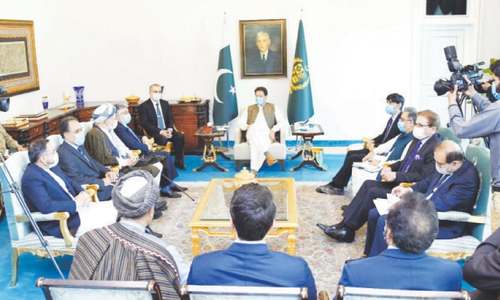ISLAMABAD: Prime Minister Imran Khan on Saturday assured United Nations Secretary General Antonio Guterres of Pakistan’s support for the continuation of UN’s humanitarian work in Afghanistan, as Inter-Services Intelligence (ISI) Director General Lt Gen Faiz Hamid on Saturday travelled to Kabul for meeting Taliban leaders.
A readout of the telephone conversation between PM Khan and Secretary General Guterres said: “Prime Minister reaffirmed Pakistan’s full support for the smooth operation of United Nations’ humanitarian mission for Afghanistan.”
Among other concerns of the world regarding the Taliban rule, provision of a safe and secure environment for humanitarian organisations in Afghanistan is a key demand.
A major humanitarian crisis is looming in Afghanistan with many aid agencies having pulled out after the recent takeover of Kabul by Taliban. An economic turmoil is also inevitable due to the suspension of aid by major donors and halting of payments by the World Bank and International Monetary Fund. This, if it happens, can exacerbate the feared humanitarian crisis.
Although some countries have come up with commitments of humanitarian assistance for Afghanistan, they have made it clear that the same would be channelled through humanitarian agencies working in the war-ravaged country.
ISI chief travels to Kabul for meeting Taliban leaders
Therefore, for the humanitarian lifeline to be operational, it is important for the Taliban to provide safe and secure environment for the aid agencies to work.
Pakistan has earlier helped the World Health Organisation (WHO) deliver its shipment in Afghanistan. A similar arrangement with World Food Programme is also being worked out.
While underscoring the need for the international community engaging Afghanistan, prioritising humanitarian needs and ensuring economic stability, PM Khan said the measures would not only reinforce security but also preclude any mass exodus of Afghans from their country, thus preventing a refugee crisis.
So far very few Afghans have left their country for refuge in neighbouring countries, but fears of a refugee outflow remain. UN Refugee Agency last week said up to 500,000 Afghans could flee their country by the end of this year.
The PM Office said the premier in his conversation with the secretary general stressed the opportunity to put an end to 40 years of conflict in Afghanistan must be seized by enabling the Afghans to achieve lasting peace, security and prosperity.
It is believed that the ISI chief’s visit ahead of the installation of the new government was also meant to address some of these issues. He was accompanied on the trip by a delegation comprising senior officials.
A security source said he was to speak to Taliban leaders about issues of concern to both Pakistan and the international community especially humanitarian assistance and evacuation of foreign nationals still stranded in Afghanistan.
Much like humanitarian assistance, evacuation of remaining foreign nationals is a key concern for their countries of origin.
The international community has, moreover, been demanding formation of an inclusive government, permission for Afghans wanting to leave the country, and no terrorist sanctuaries.
Recognition of the new government by other countries would depend on Taliban fulfilling these demands.
Meanwhile, Afghan Taliban have been making gestures to the world that they intend to engage others.
The ISI chief’s trip, which was possibly meant to be secret, became public after he was spotted along with Pakistan’s Ambassador to Afghanistan Mansoor Ahmad Khan and other officials at a hotel in Kabul taking tea. A picture taken by a journalist on that occasion went viral on social media.
Some claim it was Gen Hamid’s second visit to Kabul in as many weeks.
Last week CIA Director William Burns too was in Kabul for a meeting with Taliban leader Abdul Ghani Baradar, while Foreign Minister Shah Mahmood Qureshi told a presser on Friday Taliban were the “new reality” in Kabul and Pakistan had no other option, but to work with them.
Also on Friday, the deputy head of Taliban’s political office in Qatar Sher Mohammad Abbas Stanikzai called on Pakistan’s ambassador in Qatar Syed Ahsan Raza Shah. “Both sides discussed the current Afghan situation, humanitarian assistance, bilateral relations based on mutual interest and respect, reconstruction of Afghanistan and issues related to facilitating people’s movement at Torkham and Spinboldak,” Taliban spokesman at the Qatar office Suhail Shaheen tweeted.
Published in Dawn, September 5th, 2021
















































